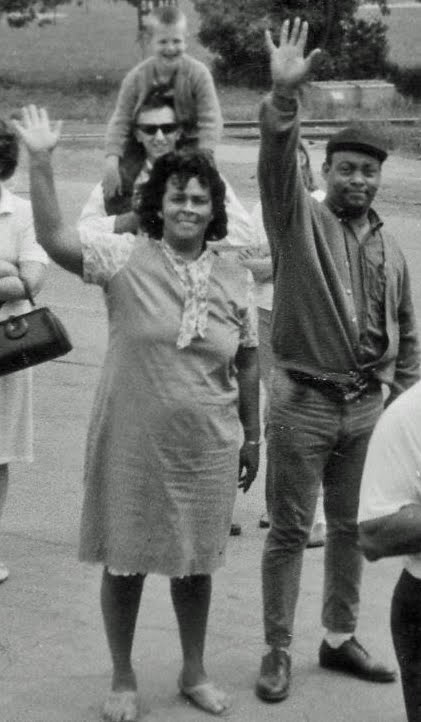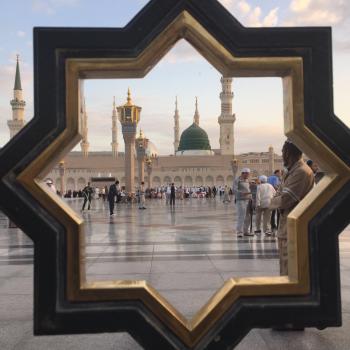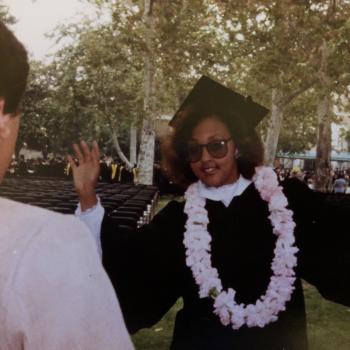My grandmother didn’t have to see the world.
My mother placed it at her feet with two foreign looking Muslim grandchildren.
She had strong Christian values yet once my mother converted to Islam she stopped cooking pork and carpooled us back and forth to Quran classes.
She hated to travel but that was perfectly fine with her because my mother did enough traveling for the both of them. My mother would beg and plead for her to come with us on trips to Europe or the Middle East but her curiosity would remain hindered by her fear of the outside world.
She was perfectly content staying in the house my grandfather built from the ground up.
I think it reminded her of him.
Perhaps it was the spot in the living room where he used to sit and read the paper every morning or the fact that his hands had touched every brick the house stood on that made her so disagreeable when anyone would mention her leaving.
That was what women did in her time. Their lives were dedicated to their families.
No matter what.
My grandmother was born in the 1920s on the Southside of Chicago. It was a time of intense racial segregation and the seeds of the civil rights era were slowly coming to fruition. As one of her youngest grandchildren, I would listen to tales of her growing up with her sisters, the viewing of Emmitt Till’s body, and sneaking off to high school dances. This was a side of my grandmother I always wanted to know more about.
The black and white pictures inside her living room china cabinet burst with images of a young, beautiful black woman with jet black hair swept into a French roll. She was always looking off into a distance, only adding to the mystery of my grandmother’s past.
But her youthfulness was nothing but a mere memory tucked away in a fragment of time. She was now a woman in her 80s unable to walk after bilateral knee replacements – widowed and alone. Her vigor for life was gone after the passing of my grandfather.
He had been a quiet and reserved man. During his time, masculinity was largely defined by tending to the financial needs of one’s family. He worked in a local steel mill while my grandmother raised my mother and two uncles.
My mother once told me that she never saw them argue, something that seems nearly unbelievable in today’s day and age.
Later in life, he became chronically ill. My grandmother learned how to administer at-home dialysis and then, later, assisted him in his affairs when he began to lose his eyesight to glaucoma.
After my grandfather’s death, my grandmother sank into a deep and severe depression. This newfound state would last for almost ten years. Even though I sympathized with her, I never quite understood how one could rely so heavily on another person until I went through my own life altering circumstance.
Shortly before her passing, I broke the news to her that I was separating from my then husband. She was in hospice and dying of lung cancer.
She looked at me with utter disappointment.
“Child, there is no way for you to work this out? This is your husband.”
“No ma’m, it’s over.” I said, abruptly yet respectfully. I knew what was coming and wanted to stop it before it started.
Sensing my frustration she stopped, but not before saying, “You must have not really loved him anyways.”
Her frankness cut the silence in the room.
I didn’t argue or correct her. There was nothing to say because, in her mind, my actions meant I didn’t love him – loyal women never left their men.
And I was being, simply put, disloyal.
It’s been almost four years since her passing but I vividly remember this conversation. And, over the years, I’ve reflected on what it truly means to be loyal in a relationship.
Is loyalty relative? Or is there a universal way to define it?
I truly believe that one must stay committed and loyal to the fundamentals of a healthy relationship. Do some people cop out of marriages too soon? Definitely. Do some people stay in relationships out of shame associated with a divorce? Certainly. But there’s a balance. Most of us who have been divorced understand this internal tug of war. Sometimes the desire for wanting to get out of a relationship can be just as strong as wanting to exhaust all options to make it work.
The older I get I realize that my grandmother set an example for what it truly meant to remain committed in a relationship. That type of “old school” loyalty doesn’t exist any longer. When we see it, most are in awe and amazed. Most are lucky to make it to their ten year anniversary. My grandmother was married for nearly sixty years.
It takes love, patience and most of all sacrifice to truly make a relationship work. Loyalty can have many definitions but one thing is for sure, when you see it there will be no way to confuse it with anything else.
____
This post was originally featured on Love InshAllah: The secret Love Lives of American Muslim Women http://loveinshallah.com













